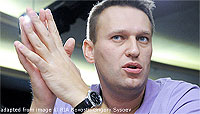Sobyanin vs Navalny: One wins, did the other lose?

(Moscow News – themoscownews.com – Anna Arutunyan – September 10, 2013) The pro-Kremlin Moscow mayor-elect Sergei Sobyanin may have won a firm victory in Sunday’s polls, but unexpectedly high results for his rival, opposition activist Alexei Navalny, suggest authorities got more than they bargained for when they called for snap elections.
Instead of a mayor legitimized by the first competitive Moscow election in years, the Kremlin is instead going to be dealing with an increasingly consolidated and legitimized opposition, analysts say.
Sobyanin narrowly avoided a runoff, coming in with just over 51 percent of the vote. But Navalny, who was expected to get about 18 percent according to earlier polls, came in second with over 27 percent. Navalny claimed, meanwhile, that irregularities robbed him of 2 percent and a runoff.
Four other candidates from the so-called established opposition the Communist Party, the nationalist LDPR, A Just Russia and the liberal Yabloko got 10 percent or less each.
“The authorities were so certain that victory was guaranteed [for Sobyanin] that they were unable to conduct an active campaign,” Lev Gudkov, head of the Levada Center, an independent pollster, told The Moscow News.
He cited the fact that according to a Levada poll, 69 percent of Muscovites credited Navalny’s election campaign with being the most vivid, as opposed to just over 60 percent saying the same for Sobyanin’s campaign.
“Among Sobyanin supporters, [this] led to a lower voter turnout [and] demobilization,” Gudkov said. “For the protest-minded segment of Muscovites, [this led] to consolidation.”
Dangerous game
Given that Sobyanin was an ally and former administration head of President Vladimir Putin, Sunday’s vote was widely expected to be not just an election of a regional official, but a plebiscite on where federal politics was going in general.
“The Kremlin is receiving many signals that a sizeable part of the population has problems with how it is governing the country,” Boris Makarenko, chairman of the Center for Political Technologies, was quoted by RIA Novosti as saying ahead of the election.
Lawyer and anti-corruption blogger Navalny emerged as one of the most popular leaders during an anti-Kremlin protest wave that erupted in late 2011 following State Duma elections plagued by reports of irregularities and fraud.
Navalny’s June decision to take part the in the mayoral election came in the midst of an embezzlement trial which he insisted was political revenge for blowing the whistle on corruption at state companies.
Despite a conviction in July and a five-year prison sentence hanging over Navalny, Sobyanin and his campaign staff took pains to encourage Navalny to remain in the race. Navalny’s sudden release from jail pending appeals on July 19 was widely attributed to the importance authorities placed on Navalny remaining in the race.
Although some analysts suggested the Kremlin was playing a dangerous game by encouraging Navalny, such overtures from the state were widely seen as an attempt to ensure a competitive race and lend credibility to the electoral process.
According to Gudkov, Sunday’s election failed to restore that credibility because it called into question the legitimacy of all previous elections. Furthermore, an official result of 27 percent for Navalny lent unexpected legitimacy to an opposition movement that had long been on the fringe of the political process, Gudkov said.
According to Olga Kryshtanovskaya, an expert on Russian elites at the Sociology Institute of the Russian Academy of Sciences, the election results also reflected an increasingly active and politicized blogging community.
“Navalny’s high results are directly connected to his activity on social networks,” Kryshtanovskaya wrote in a Facebook post on Monday. “The number of posts supporting Navalny on Twitter, vKontakte, Livejournal and others was 3.8 times those written in support of Sobyanin.”
According to other observers, the opposition’s support for Navalny was fueled by the government’s own actions.
“When a person is facing jail, ideological differences dissolve,” Gudkov said. “The opposition started consolidating around Navalny.”
The organizational skills gained by myriad volunteers and supporters, Gudkov added, will go a long way in building a future political party in Russia.
The beginning of politics?
The fact that Navalny’s mayoral run may have generated more future possibilities certainly rang true for Yekaterina Vostokova, an office manager who registered as an election observer on behalf of Navalny’s campaign.
“Next year, there’s a very important election into the Moscow City Duma,” Vostokova said. “And if this movement remains strong, those young people who were drawn into politics thanks to Navalny, they will play a role.”
“What’s happening now is that people are saying: stop being [just] a mass of people and start becoming citizens,” Vostkova added.
The election results show that Navalny, his supporters and the protest class as a whole have become part of the political process they’re not going anywhere, and the authorities will have to accommodate them, said Sergei Markov, a pro-Kremlin analyst and the prorector of the Plekhanov Russian University of Economics.
Sobyanin, whose aides have hinted in the past that Navalny could get a post in the Moscow government under Sobyanin, suggested on Monday that he was willing to meet with Navalny.
“I invite [him], let him come,” Gazeta.ru quoted Sobyanin as saying on Monday morning.
One direct possibility that may result from the elections, Markov said, is added weight to billionaire Mikhail Prokhorov’s Civil Platform party, whose candidate, Yevgeny Roizman, won the mayoral elections in Yekaterinburg on Sunday.
“Civil Platform will get a lot of the liberal electorate,” Markov told The Moscow News. “That’s one possibility. Another is Navalny’s own party.”
Markov is convinced that an established opposition is here to stay.
“The previous political system was created for politically-passive citizens,” Markov said. “When people became active, they went against that system. Now, there’s a system being created for the politically active as long as [they] function in accordance with the law.”
